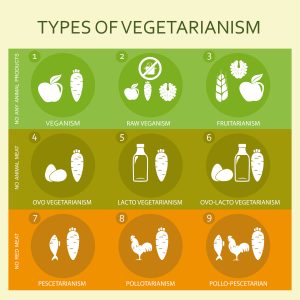Vegetarianism may not be the answer for men
We have all read the articles or watch the news on TV when they present the benefits of being vegetarian. I have seen the small string bean slim scientist or health aficionado who claims that turning to vegetarianism is the cure for all that ails us. Dr. Dean Ornish claims that it will reverse the effects of heart disease, and there is plenty of evidence to support this claim, but this research often fails to look at the quality of life.
Vegetarianism is not one diet. It is a very diverse group of diets that is nearly impossible to lump into one group. Veganism only eats fruits and vegetables, but other forms of vegetarianism may allow fish, chicken, eggs, or dairy. Some only restrict red meat. See Figure 2 for the different types.
I have personally tried a vegan and various vegetarian lifestyles. I tried vegan and found that it was too restrictive to me and I struggled to have enough calories to function without adding massive amounts of starch. I tried lactotarianism (dairy), ovotarianism (eggs), pollotarianism (chicken), and pescetarianism (Fish) and various combinations of them over the past 50 years and have found that I could stick to them for a short period but shortly lost my energy levels. The loss of energy was likely from more than nutritional effects because I was very careful to get enough calories and to take a diverse enough diet to get the vitamins and minerals I need. This was likely due to depression.
So what does the research show? A new study from 2017 looked at men who are vegetarian and if their vegetarian dietary habits are associated with significant depressive symptoms in men[1]. The study, “Vegetarian Diets and Depressive Symptoms among Men,” was published in the Journal of Affective Disorders. The study used self-reported data from 9668 adult male partners of pregnant women in the Avon Longitudinal Study of Parents and Children included identification as vegetarian or vegan, dietary frequency data, and the Edinburgh Post Natal Depression Scale. The study looked at confounding variables which include: age, marital status, employment status, housing tenure, number of children in the household, religion, family history of depression previous childhood psychiatric contact, cigarette and alcohol consumption. The researchers found that vegetarian men had significantly higher depression scores on average than non-vegetarians.
To be honest, additional studies found conflicting information, but they did not solely look at men. There are additional studies to support vegetarian meals increase your depression risk, but the results are mixed. One, “A longitudinal analysis of diet quality scores and the risk of incident depression in the SUN Project,” found that vegetarian diets reduced depression but only if they strictly followed the diet[2]. Another study performed in the UK found no association between dietary patterns and depressive symptoms[3]. Lastly, there is research to show that increased fruit and vegetable consumption results in lower depression and anxiety[4].
The bottom line: Vegetarian men have more depressive symptoms. The research is mixed, and I think the studies each looked at different questions. I suspect that both researchers might be right. Men placed on vegetarian diets that have difficulty tolerating the foods or do not like them will have increased depression. I am also comfortable with the concept that vegetarians who enjoy the diet may have less stress and anxiety. Nutritional deficiencies, such as cobalamin or iron, are also a possible explanation. Another cause cannot be ruled out, so further research is needed, but researchers need to be careful when designing their studies. If you are interested in vegetarian meals, consider trying the diet. It is not for everyone. My wife and I often do it a couple nights a week. See the book below for recipes.
References:
-
Hibbeln, Joseph R., Kate Northstone, Jonathan Evans, and Jean Golding. “Vegetarian Diets and Depressive Symptoms among Men.” Journal of Affective Disorders 225 (January 2018): 13–17. https://doi.org/10.1016/j.jad.2017.07.051.
-
Hosseinzadeh, Mahdieh, Mohammadreza Vafa, Ahmad Esmaillzadeh, Awat Feizi, Reza Majdzadeh, Hamidreza Afshar, Ammar Hassanzadeh Keshteli, and Peyman Adibi. “Empirically Derived Dietary Patterns in Relation to Psychological Disorders.” Public Health Nutrition 19, no. 02 (June 10, 2015): 204–17. https://doi.org/10.1017/s136898001500172x.
-
Northstone, Kate, Carol Joinson, and Pauline Emmett. “Dietary Patterns and Depressive Symptoms in a UK Cohort of Men and Women: A Longitudinal Study.” Public Health Nutrition, September 18, 2017, 1–7. https://doi.org/10.1017/s1368980017002324.
-
Sánchez-Villegas, Almudena, Patricia Henríquez-Sánchez, Miguel Ruiz-Canela, Francisca Lahortiga, Patricio Molero, Estefanía Toledo, and Miguel A. Martínez-González. “A Longitudinal Analysis of Diet Quality Scores and the Risk of Incident Depression in the SUN Project.” BMC Medicine 13, no. 1 (September 17, 2015). https://doi.org/10.1186/s12916-015-0428-y.









Leave a Reply